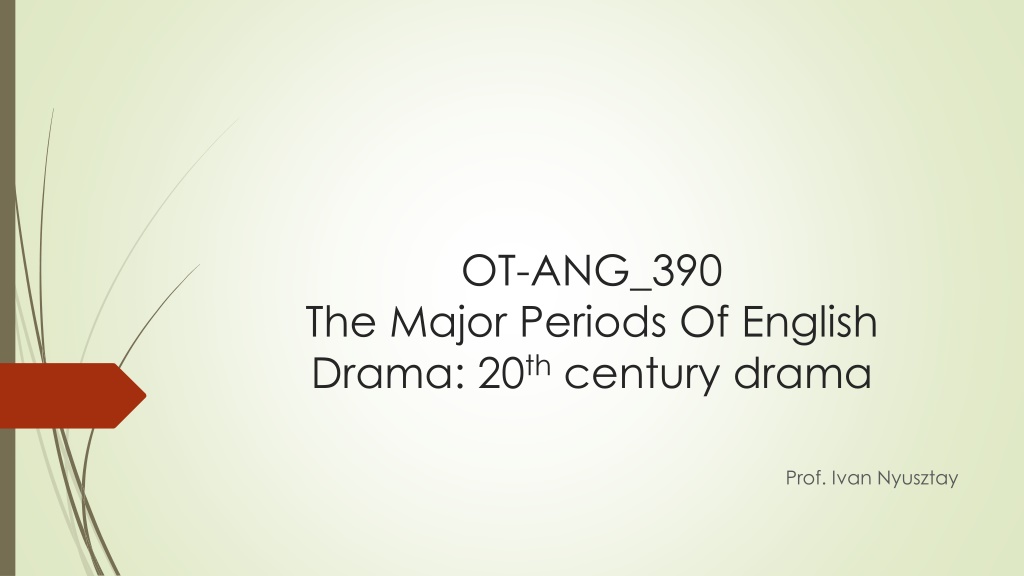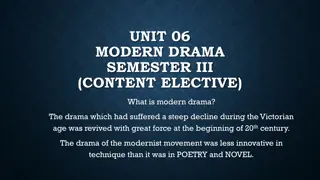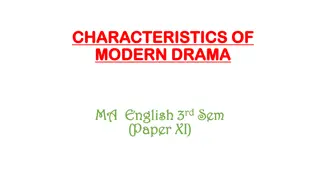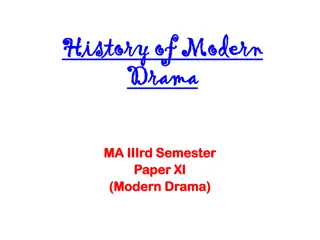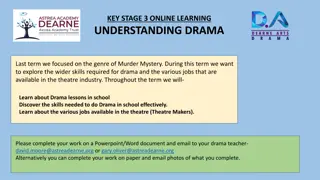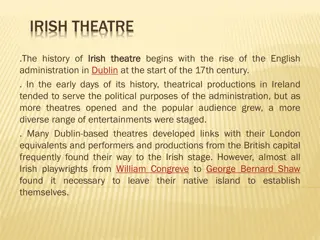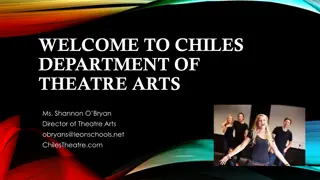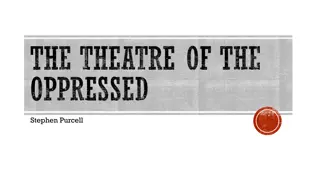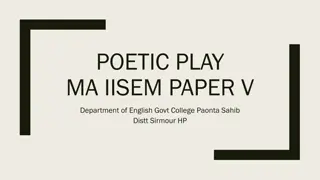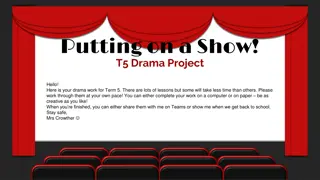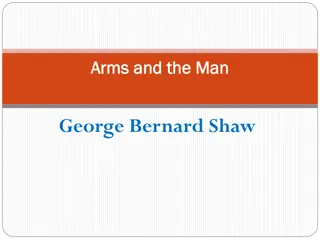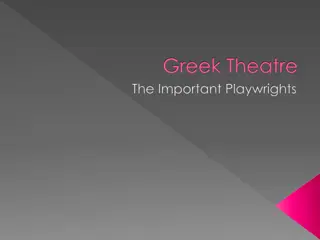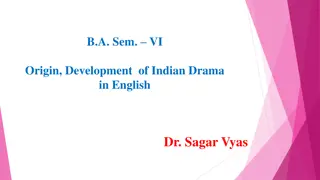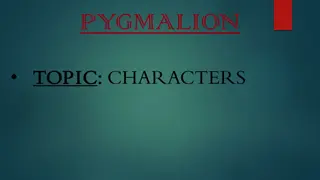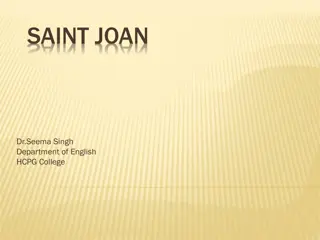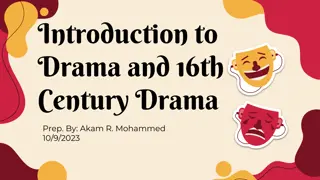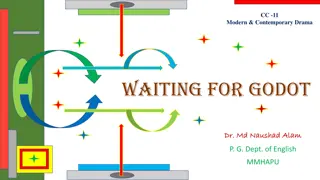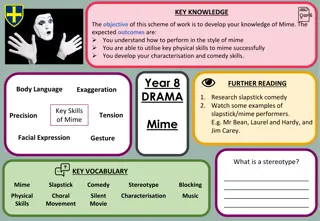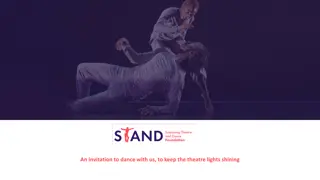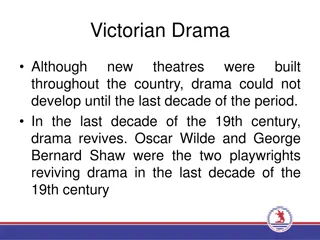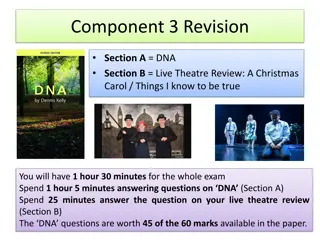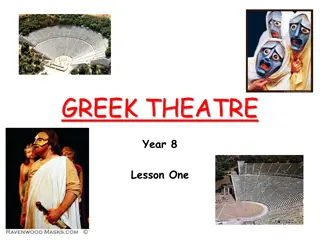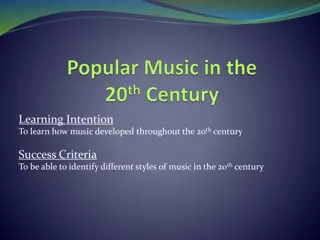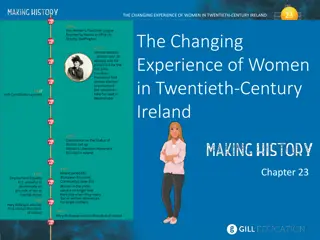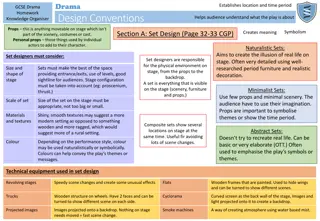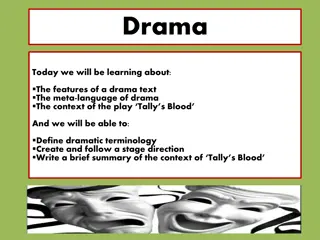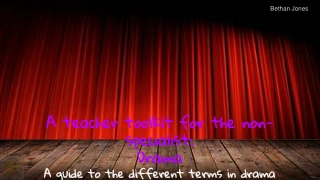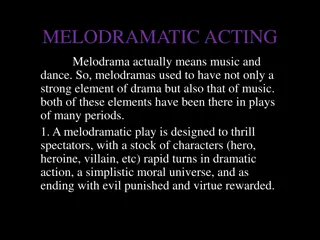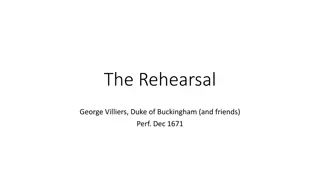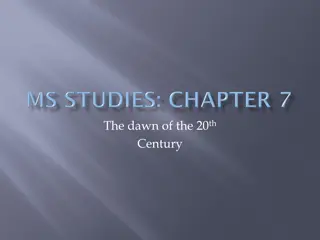Evolution of English Drama in the 20th Century: Shaw, Ibsen, and Modernist Theatre
The 20th century English drama witnessed significant shifts, from the realism and naturalism of George Bernard Shaw and Ibsen to the modernist theatre of Samuel Beckett, Tom Stoppard, and Harold Pinter. Themes of social change, rejection of traditional ideals, and a focus on human experiences dominated this era, challenging conventional norms and exploring new perspectives on human existence and society.
Download Presentation

Please find below an Image/Link to download the presentation.
The content on the website is provided AS IS for your information and personal use only. It may not be sold, licensed, or shared on other websites without obtaining consent from the author. Download presentation by click this link. If you encounter any issues during the download, it is possible that the publisher has removed the file from their server.
E N D
Presentation Transcript
OT-ANG_390 The Major Periods Of English Drama: 20thcentury drama Prof. Ivan Nyusztay
Modern British Drama 1890: Shaw s lecture on The Quintessence of Ibsenism Realism, naturalism vs idealism Modernist attitude: therapeutic, social change, rejecting the past The angry young men: Osborne The Theatre of the Absurd: Samuel Beckett, Tom Stoppard, Harold Pinter
Naturalism Raymond Williams, Culture and Society (1958): naturalism is a process of steadily excluding from the dramatic action any supernatural intervention or agency, so that the human action, however judged, is played in exclusively human terms A new sense of the material environment as a man-made world new capitalist social order and altered relations between human beings and material things. laws and factors that govern human lives can be explored and analysed by simply assessing human beings themselves, through their lives and actions. scientific method used by naturalistic writers: studying human beings instincts and passions from a detached observer s stance, taking note of the factors of heredity and environment in governing human lives. Darwinian methodology, applying scientific research methods such as causality, determinism, experimentation and explanation to its study of human beings and observing human beings as though they were products.
George Bernard Shaw (1856-1950) The Quintessence of Ibsenism Realism against idealism: Our ideals, like the gods of the old, are constantly demanding human sacrifices. Let none of them, says Ibsen, be placed above the obligation to prove itself worth the sacrifices it demands The realist loses patience with ideals altogether, and sees in them only something to blind us, sg to numb us, sg to murder self in us Introducing Ibsen to the English stage: Life-denying idealism, internal contradictions, trapping the audience, discrediting socially conditioned reflexes, expectations The theatre is not there to amuse people, it s object should be to make them think
The function of theatre Shock therapy: being shocked necessary for progress in society Theatre: no refuge Stage life: not idealized No relief from omnipresent foulness Spectator outraged as well as critics Ibsen and Shaw: expose conventions Ridicule the well-made play , theatrical artificialities
Shaws work 5 novels, 52 plays, political tracts, reviews, music criticism, essays, etc. Nobel prize: 1925 Witticisms, humour, verbosity, eloquence Social comedies: Pygmalion, Back to Methuselah, etc. Historical plays: Caesar and Cleopatra, Saint Joan, etc. Political writings: The Intelligent Women s Guide to Socialsim and Capitalism. Marxist. Concern with the future: To Shaw most of the past is simply a mess which ought to be swept away in the name of progress, hygiene, efficiency and what not (Orwell). Optimistic: only reality is change
John Osborne (1929-1994) No brave causes left : inability to act Movement: towards isolation Angry young men Kitchen-sink realism Repetitive structure, circularity of action Always Sunday: stasis and displacement Alienation from society and introversion
Osborne: Anger and detachment Look Back in Anger (1956) Negativism: purely verbal rebellion Theatrical vitality: constant flow of talk, clash of temperaments Egocentricity, one-man diatribes Rhetoric in a vacuum, detached from experience Coping with vulnerability, appeal for pity and understanding
Osborne: Alienation Alienation: boredom Symptomatic of Dasein in anxiety (Heidegger) Personality without direction and meaning But: Jimmy is vitally active, confronts love, defeat, death Campaign against apathy and deadness Alison s defence: imperturbability that fuels Jimmy s attacks Temporary solace in confessions, histrionics, sex
Osborne, The Entertainer (1957) Jean: Here we are, we re alone in the universe, there s no God, it just seems that it all began by sg as simple as sunlight striking on a piece of rock. And here we are. We ve only got ourselves. Somehow, we ve just got to make a go of it. We ve only ourselves. On theatre: Drama rests on the dynamic that is created btw characters on the stage. It must be concrete and it must be expressed, even if it is only in silence or a gesture of despair. The theatre is not a school room, nor is it, as many people seem to think, a place where discussion takes place, where ideas are apparently, formally examined in the manner of a solitary show- off in an intellectual magazine. It is a place where people spend much of their time responding nakedly or failing to the burden of trying to live and preparing to die.
The Theatre of the Absurd (M. Esslin) Ab-surdus: deaf, unheard of The myth of Sisyphus (Albert Camus) Cyclicity vs linearity Suspending action Eugene Ionesco: "Absurd is that which is devoid of purpose. . . . Cut off from his religious, metaphysical, and transcendental roots, man is lost; all his actions become senseless, absurd, useless Thinking debunked (cf. Beckett and Pinter) But: dignity of man manifest in repeated acts of verifying the absurd Suicide: misunderstanding the absurd (Camus)
Samuel Beckett (1906-1989) Novelist, dramatist, poet Novels: Murphy, the trilogy (Molloy, Malone Dies, The Unnamable), Watt Drama: full length plays (Waiting for Godot, Happy Days) Minimalist plays: Not I , Act Without Words , Rockaby From pairs to isolated characters From isolated characters to body parts Joyce vs Beckett: omniscience vs impotence
Beckett: major topics Homo patiens and uselessness Human choice: carrot or turnip Claustrophobia: mounds (Happy Days), ashbins (Endgame), urns (Play) Entertainment: thinking and dancing Lack of causality, beginning and end Constipation: verbal and physical Language: self-referential, repetitive The pitfalls of habit
Beckett: Waiting for Godot (1955) Key word: perhaps No place no time The thieves crucified with Christ Nothing happens: twice (2 Acts) Pairs: Didi and Gogo, Pozzo and Lucky Godot: not God Characters tied to the spot Contradictions: I m going
The Birthday Party https://www.youtube.com/watch?v=H4K__NRJSDg
Harold Pinter (1930-2008) Dramatist, poet, political essayist Short and full-length plays Condensation of life: the room plays (The Room, The Birthday Party, The Caretaker, The Dumb Waiter) Beckettian pairs and a third Dramas of alterity Objection to symbolism
Pinters language and silence Coercive language vs referential language Language of familiarity: breakfast ritual, newspaper, etc How to do things with words (J. L. Austin) How to do things with silence Silence: two types Silence and communication in A Slight Ache (1958) One way of looking at speech is to say that it is a constant stratagem to cover nakedness.
Pinter and the Room Given a man in a room and he will sooner or later receive a visitor. A visitor entering the room will enter with intent. If two people inhabit the room the visitor will not be the same man for both. A man in a room who receives a visit is likely to be illuminated or horrified by it. The visitor himself might as easily be horrified or illuminated. A man in a room and no one entering lives in expectation of a visit But however much it is expected, the entrance, when it comes, is unexpected and almost always unwelcome
The room symbolism The room as theatre Room realism: domestic Settings: parts of London The room as womb The room as tomb The room as doom
Pairs and the Third The Third arrives but never as expected The Third has always been there The Third is variable Ethics and politics Internal alterity Topics: hospitality, responsibility, the menacing external (and internal) world, dying, betrayal, gender roles, etc
The Birthday Party (1957) Boarding house run by Meg and Petey Only tenant: Stanley Weber Guest son, host mother Invading others: Goldberg and McCann Organizing birthday party : rebirth Darkness: blind man s buff Violence, rape You betrayed the organization
Pinter: The Dumb Waiter (1960) Unique pair: Ben and Gus Basement room Waiting for order Language use controversy D.W.: non-correspondence btw order and service Breakdown of communication Ambiguity overwhelming: Ben about to kill Gus?
Tom Stoppard (1937-) Dramatist, writer of film scenarios Early plays influenced by Beckett (Ros and Guil are Dead) New topics: philology (Arcadia), logic (Jumpers), physics Hapgood), history (The Coast of Utopia) Shakespeare reloaded: Dogg s Hamlet, Kohout s Macbeth) Vaclav Havel, Samuel Beckett and Tom Stoppard Film scenario: Shakespeare in Love
Stoppard: Rosencrantz and Guildenstern are Dead (1967) Characters from Hamlet: change of perspective Heads or tails: lose their heads Players: parody and ridicule of Elizabethan theatre Mission: glean what afflicts him Mission impossible: lack of understanding 2 languages: Elizabethan vs Stoppardian The question-answer game (youtube video) Victims of unintelligible powers
The Real Inspector Hound (1961-62) Postmodern Whodunit Crime story conventions challenged The inspector from Poe s Chevalier Dupin to Doctor House Chaos and cosmos Rationality vs the absurd Critics: Birdboot and Moon Boot: Beckettian burlesque Moon: Stoppardian lunacy
Shakespeare and the absurd Ros and Guil are Dead Antiherosim Hamlet Heroism Mission: to understand Mission: set the time right Situation established them Establish the situation Alternatives Choice Suffering: no explanation Suffering: readiness Language: 2 versions Language: Elizabethan Truth: unattainable Truth: found Being in a box from the beginning Putting 7 people in a coffin
Edward Bond (1934-): Lear (1971) "I write about violence as naturally as Jane Austen wrote about manners. Violence of modern society Theatre of cruelty (Artaud) and Saved (1965) Desire for power Murder, rape, suffering Seeing and being blinded (Lear) Alienation effect (Brecht): asides Intellect rather than emotions
Caryl Churchill (1938-) Abuses of power and technology Sexual politics (gender) and feminist themes Farce, absurd, surrealism Comedies, verse-plays, librettos, radio plays Grotesque, alienation, social stereotypes Owners (1972): private property (owning the material world and the other) 2 radioplays on psychiatrists and patients: who is normal? What is acceptable?
Cary Churchill: language Words vs silences (Pinter) Rhythm of language, precise authorial instructions (Beckett) Broken, unfinished sentences Experiments with words, different versions for completion Digressions and repetitions (Stoppard) Language detached from reality (Pinter)
Topics in Churchill Ecocriticism: Not Not Not Not Not Enough Oxygen (1971) Using of oxygen sprays at home and fragmented speech Caricatures of celebrities, self-realization, successful carriers: Top Girls (1982) on women, Serious Money (1987) on men (male-dominated carriers) Technology: A Number (2002): cloning The individual is not unique, being one of the replicas, foreboding tone
Martin MacDonagh (1970-) Film director and playwright Irish settings, themes: The Leenane Trilogy, The Aran Islands Trilogy Hangmen (2015): traditional comedy thriller Cruelty, menace, violence Pinter s early works were full of menace and caught that peculiar tension between everyday England and the darkness that often lurked just beneath Insisting on film: theatre "is never going to be edgy in the way I want it to be
THANK YOU FOR YOUR KIND ATTENTION!
